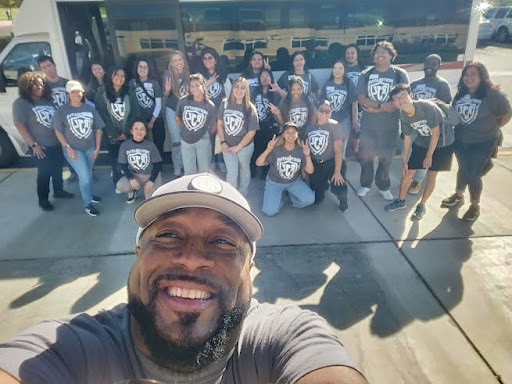Restorative Justice League: Making A Real Difference With A Framework Rooted In Care, Community & Connection

At the heart of Restorative Justice League (R.J.L.) is the belief that thriving environments are cultivated by building bridges and offering opportunities. Founded in 2014 by youth development expert Andre Griggs, the organization makes a tangible difference through multi-tiered systems of support (MTSS). Through its nonprofit and for-profit services, R.J.L. addresses the needs of schools and students with a comprehensive approach.
With a culture shaped by diversity, peace, and empowerment, R.J.L.'s mission is clear: to champion a society where students are guided down the right path with care and safety, and where everyone is family. This purpose is the culmination of Griggs' firsthand experiences in the industry, dating back as far as 2009.
During his restorative practices training, he was introduced to The California Endowment for the first time. While working with the organization's trainers to restore justice in schools, Griggs assisted in rolling out an effective teachers' program. While the experience was rewarding, it also highlighted a glaring gap in the industry: a lack of initiatives focused on amplifying the youth's voice.
"The feedback we kept receiving from students was that, while it was helpful, they didn't feel included in the process," he recalls. To address these concerns, Griggs was tasked with implementing a complementary youth program. Provided with 12 students and assistance from the Cal Endowment's trainers, he created a curriculum designed to empower students through their academic and personal journeys.
The true inspiration for R.J.L.'s model, however, blossomed from a setback. Before he could implement his model within the school, Griggs witnessed an avid teacher's dilemma: two students had cheated on an end-of-year test, and the teacher, supportive of R.J.L. but trained in old punitive ways, decided to make the entire class retake the exam. "What followed was to be expected," he adds. "Other students were upset, which stirred feelings of guilt and isolation within the two who had cheated."
Overwhelmed with the situation, Griggs simply said: "Figure it out and come up with an alternative." Equipped with months' worth of knowledge, the students' plan embodied the restorative essence of R.J.L., with a unanimous agreement: the senior class wasn't to retake the test, and the two students were to be honest about what happened. Without punitive measures, they were able to offer an alternative that was both disciplinary and restorative, encouraging others to take accountability without hindering their long-term success.
"It was as simple as writing an apology letter to their peers. And the best part? No one had to convince them to do so," he adds. "They knew they did something wrong, but were still given the opportunity to reconcile with other students and graduate. They learned a lesson based on merit and lived experience, not fear."
Since founding R.J.L. in 2014, Griggs has remained dedicated to this vision of fostering schools that are compassionate, empathetic, and inspiring. The organization's two sides complement each other, offering an all-encompassing solution to a critical societal problem. While its nonprofit arm focuses on sparking community engagement with a wellness center, R.J.L.'s for-profit vertical centers on educational conferences and school staff consulting.
By partnering with like-minded nonprofits and providing continuous support, it also trains college and high school students to become mentors to their younger peers. The school-to-prison pipeline is also a central part of R.J.L., challenging the 'zero-tolerance' narrative that punishes students with complex lives. By rewriting this narrative, the organization empowers students with difficult situations to change the trajectory of their lives.
To fuel this cycle of growth and positivity, R.J.L. helps schools implement its restorative three-tiered model, which includes community building, mediation, and reintegration. This framework educates teachers on alternative discipline strategies, creates community-centric initiatives, helps navigate conflict by encouraging open communication, and helps students reintegrate into classrooms.
"Every growth story takes a village," Griggs adds. By including parents, teachers, and peers in the process, R.J.L. ensures that every community member has a role to play. Looking ahead, the organization envisions its model spreading across the US and globally, starting with 14 more schools in Merced, California. "At the end of the day, it's all about hope," he reflects. "We all make mistakes, some people more often than others. But standard practices only keep this vicious cycle spinning. Instead of punishment, it's time to give students a fighting chance at success."
© Copyright IBTimes 2025. All rights reserved.





















